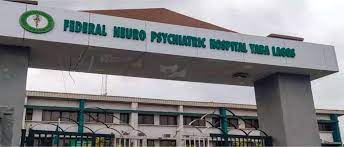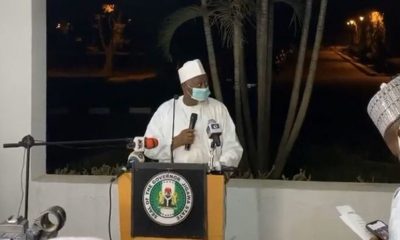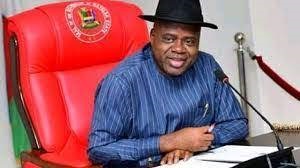COVER
Poor Economy, Social Factors Surge Psychiatric Cases in Nigeria — Experts

By David Torough with Agency Reports
Poor economy and social factors have continued to aggravate the mental health challenges among Nigerians, medical experts have observed.
With inadequate and not quite good medical facilities, those with mental health challenges and their care givers are passing through very turbulent times as they seek medical help.
The Federal Neuro-psychiatric Hospital, Yaba for instance, has recorded 100 percent increase in the number of psychiatric patients admitted in the hospital in 2023.
The Chief Medical Director of the hospital, Dr Olugbenga Owoeye, made this known at the Annual Score Card presentation tagged: “A Day With the Medical Director” organised by the hospital on Wednesday in Lagos.
Owoeye said the total number of new cases increased by seven percent, while there was three percent increase in the number of follow-up patients male and female.
According to him, the increase in the admission cases can be attributed to the rising cases of mental health conditions in the country due to the current economic challenges accompanied by other socio-economic factors.
He said, “It can be deduced that in 2023, the total number of all patients attendance increased by three percent. There was a seven percent increase in new cases attended, compared to no increase in 2022.
“We also have 100 percent increase in admission cases in which the drug abuse cases is 10 percent increase and discharge cases is reduced by 10 percent.”
On the achievements recorded by the hospital within the period under review, Owoeye listed completion of the administrative building, Yaba, rehabilitation of internal roads and drainages in Yaba and Oshodi annex of the hospital.
He said others included rehabilitation of hospital wards, Yaba and Oshodi annex, ongoing construction of work on the Tele- Psychiatric centre in the hospital, upgrading of the physiotherapy department and ongoing construction work on the Out-patients Clinic in the hospital among others.
“Under my watch as the medical director, major developmental projects were facilitated at different stages and times both in Yaba and Oshodi annex which has greatly improved the pictorial state and aesthetics value of the hospital as well as health service delivery compared to what it was in the time past.
“This had been made possible with funds released by the Federal Government for capital projects,” Owoeye said.
Owoeye identified inadequate manpower and funding as the two major challenges faced by the hospital within the year under review – 2023.
According to him, the recent exit of health professionals in the country in search of the proverbial green pasture has had its significant effects on the hospital manpower.
He emphasised the urgent need to put in place a system for the replacement of those that had left and reduce the bureaucratic bottlenecks with approval for replacement for those that had exited the system.
On prospect for 2024, Owoeye said that welfare of the staff would be prioritised and efforts would be made to boost manpower development and training of staff.
“In 2024, every effort will be made to ensure that all ongoing projects in the hospital are completed within the time frame.
“It is expected that the completion of these projects will further enhance the quality of mental health care service delivery in the hospital. We hope to embark on more new projects in 2024.
“With prudent management of the available resources, every effort will be made to attend to the welfare of the staff. It will be on the front burner of the management in 2024,” Owoeye said.
n 2021, the Association of Psychiatrists in Nigeria described the increasing cases of mental illness among Nigerians as a national crisis and called for the incorporation of mental health into primary healthcare to improve access and address stigma.
The president of the association, Prof Taiwo Obindo who sought enactment of a new law on mental health told journalists that such would regulate the practice of psychiatry, how people who are mentally ill would be handled humanely and would be an improvement on the one promulgated in 1902 and reviewed in 1958.
The House of Representatives had in 2021 directed its Committee on Health Institutions and Healthcare Services to collaborate with the Federal Ministry of Health towards improving mental health facilities across Nigeria.
But Obindo said, “Surely, the issue of mental illness is a major challenge. Those figures (WHO figures) were actually obtained some years back before the recent incessant kidnapping, Boko Haram attacks and all that. You can be sure that the figure would be higher now.”
The house expressed worries that Nigeria had only 130 psychiatrists with over 20 million citizens suffering from mental disorders.
This situation, it was said would apparently cause the situation to degenerate.
Experts have identified brain drain, dearth of facilities, inequality in the health sector and insecurity as factors responsible for the lack of adequate manpower to provide mental health services in the country.
They also described the situation as a burden on the few mental health workers available across the country.
COVER
FCT Natives Reject Relocation from Ancestral Land, Demand Integration

By Ubong Ukpong, Abuja
Natives of the Federal Capital Territory (FCT) yesterday rejected the decision of the Federal Capital Territory (FCT) to work out a compensation package for their ancestral lands and relocate them.The natives insisted they should rather be integrated into the Urban Renewal Policy of the FCT.
They argued that the continuous push to displace them from their native land was a gross violation of their fundamental rights and the rule of law. They pointed out that only an inclusive urban renewal and integration approach will guarantee their acceptance, comfort, and provide both humane and equitable alternatives for them.They made this stance at a public hearing organized by the House of Representatives Committee on Area Councils and Ancillary Matters.The Sepeyi of Garki, Chief Usman Nga Kupi, who represented the ‘Ona of Abaji’ said, the natives had already made so much sacrifices, including the loss of their ancestral lands and property for national development without reciprocity since the Federal Capital Territory was moved from Lagos to Abuja .Also speaking, Hon. Bala Iya, who spoke for the Kpaduma community, expressed concerns over what he described the as a longstanding injustice and discriminatory practices against the natives.According to him, farmlands had been seized without compensation in the past leading to disruption of the only means of livelihoods as well as people’s spiritual and cultural ties.“The resettlement process must include allocation of reasonably sized land, with proper title documents and financial support for building development as approved by Development Control,” he said.Meanwhile, the Original Inhabitant Development Association of Abuja called for a constitutional amendment to secure equal rights for FCT natives.Represented by Giwa Bamaiyi, the group’s President, Pastor Danladi Jeji, proposed the establishment of a National Commission for Indigenous Peoples to address the systemic challenges faced by original inhabitantsEarlier, while declaring the hearing open, Speaker of the House of Representatives, Hon. Tajudeen Abbas, urged all stakeholders to freely express their views, noting that such contributions would assist lawmakers in arriving at informed legislation that will stand the test of time.Abbas, who was represented by Hon. Joe Oke Onuakalusi, described the intervention as a critical step towards promoting national unity and the brotherhood embedded in Nigeria’s constitution and national anthem.He noted that the issue of integrating FCT indigenes has been a recurring debate across successive administrations, emphasizing that the matter is not just relevant to Abuja but has broader implications for justice and equity across the country. The Speaker therefore, charged the committee to carefully document all contributions made during the hearing, assuring that the 10th House, under his leadership, was committed to developing legislative solutions that reflect the collective aspirations of the people.Chairman of the House Committee on Area Councils and Ancillary Matters, Hon. Fredrick Agbedi, explained that the hearing was prompted by a motion moved on the need to explore alternative approaches to resettling or integrating both indigenous and non-indigenous residents in the FCT.“The FCT is a symbol of unity and a representation of our national ideals. It was built for all Nigerians, irrespective of ethnic, religious, or regional backgrounds. “However, with growth and diversity come complex challenges—including the displacement of indigenous communities, the unclear status of non-indigenous residents, and the tension between customary land rights and modern urban planning”, he said.In his remarks, Director of Resettlement and Compensation at the FCDA, Nasiru Suleiman, requested additional time for the agency to present its memorandum, which the committee granted him a two-week extension to enable the FCDA to submit its presentation.COVER
Global Finance Names Zenith Best Nigerian Bank

By David Torough, Abuja
Zenith has been crowned Nigeria’s Best Bank in the Global Finance Best Banks Awards 2025The financial institution was named “Best Bank in Nigeria” by the same organisers for the fifth time in six years.The Bank was among winners from 36 countries in Africa recognised by the prestigious Global Finance in its 32nd Annual Best Bank Awards.
The criteria for winners of this year’s awards was those banks that attended carefully to their customers’ needs in difficult markets and accomplished strong results while laying the foundations for future success. Winning organizations managed their assets and liabilities in a savvy way despite the fast-changing interest rate scenarios.The editors of Global Finance made the selections after extensive consultations with corporate financial executives, bankers and banking consultants, as well as analysts worldwide.Other factors considered in selecting the top banks ranged from the quantitative objective to the informed subjective. Objective criteria considered included; growth in assets, profitability, geographic reach, strategic relationships, new business development and innovation in products.Subjective criteria included the opinions of equity analysts, credit rating analysts, banking consultants and others involved in the industry.Commenting on the award, the Group Managing Director/Chief Executive of Zenith Bank, Dr. Adaora Umeoji said: “We are thrilled to retain our position as the Best Bank in Nigeria for the fifth year from 2020. This achievement is a testament to our unwavering commitment to delivering exceptional customer service, innovative financial solutions and dedication to serving our customers with efficiency and a strong focus on corporate governance. We will continue to invest in our people, technology and processes to ensure that we consistently maintain the highest level of service delivery”.She lauded the contributions and efforts of the Bank’s key stakeholders – the Founder and Chairman, Jim Ovia, for his visionary leadership and role in laying the foundation for an enduring and successful institution, the Board for the consistent guidance they provide, the staff for their commitment and dedication, and the Bank’s customers for their unwavering loyalty and support to the Zenith brand.Joseph D. Giarraputo, publisher and editorial director of Global Finance, said: “Global banking continues to adapt and evolve, meeting challenges and capitalizing on opportunities with resilience and innovation. AI has quickly taken a pivotal role in the transformation of banking, and its growth promises to reshape the financial sector at an unprecedented pace.” He added that: “Global Finance’s Best Bank Awards honor financial institutions that excel in diversity of offerings, long-term stability, and technological innovation.”Global Finance’s “Best Banks Awards” are recognised amongst the world’s most influential banking/finance and corporate professionals as the most coveted and credible awards in the banking industry, with winners chosen in 150 countries and territories across Africa, Asia Pacific, the Caribbean, Central America, Central & Eastern Europe, Latin America, the Middle East, North America and Western Europe.Founded in 1987, Global Finance regularly selects the top performers among banks and other financial services providers, and the awards have become a trusted standard of excellence for the global financial community.Zenith Bank’s track record of excellent performance has continued to earn the brand numerous awards including being recognised as the Number One Bank in Nigeria by Tier-1 Capital for the fifteenth consecutive year in the 2024 Top 1000 World Banks Ranking, published by The Banker Magazine.The Bank was also awarded Bank of the Year (Nigeria) in The Banker’s Bank of the Year Awards for 2020, 2022 and 2024; Best Bank in Nigeria from 2020 to 2022 and in 2024, in the Global Finance World’s Best Banks Awards; Best Bank for Digital Solutions in Nigeria in the Euromoney Awards 2023; and was listed in the World Finance Top 100 Global Companies in 2023.Further recognitions include Best Commercial Bank, Nigeria for four consecutive years from 2021 to 2024 in the World Finance Banking Awards and Most Sustainable Bank, Nigeria in the International Banker 2023 and 2024 Banking Awards. Additionally, Zenith Bank has been acknowledged as the Best Corporate Governance Bank, Nigeria, in the World Finance Corporate Governance Awards for 2022, 2023 and 2024 and ‘Best in Corporate Governance’ Financial Services’ Africa for four consecutive years from 2020 to 2023 by the Ethical Boardroom.The Bank’s commitment to excellence saw it being named the Most Valuable Banking Brand in Nigeria in the Banker Magazine Top 500 Banking Brands for 2020 and 2021, Bank of the Year 2023 and 2024 at the BusinessDay Banks and Other Financial Institutions (BAFI) Awards, and Retail Bank of the Year for three consecutive years from 2020 to 2022 and in 2024 at the BAFI Awards.The Bank also received the accolades of Best Commercial Bank, Nigeria and Best Innovation in Retail Banking, Nigeria, in the International Banker 2022 Banking Awards.Zenith Bank was also named Most Responsible Organisation in Africa, Best Company in Transparency and Reporting and Best Company in Gender Equality and Women Empowerment at the SERAS CSR Awards Africa 2024; Bank of the Year 2024 by ThisDay Newspaper; Bank of the Year 2024 by New Telegraph Newspaper; and Best in MSME Trade Finance, 2023 by Nairametrics. The Bank’s Hybrid Offer was also adjudged ‘Rights Issue/Public Offer of the Year’ at the Nairametrics Capital Market Choice Awards 2025.COVER
Mokwa Flood Disaster: Niger Orders Low Key Eid el-Kabir Celebration

From Dan Amasingha, Minna
Niger State Government has ordered for the suspension of the traditional horse riding durbar to mark the Eid-el-kabir across the eight Emirates in the State.The Secretary to the Government of Niger State, Alhaji Abubakar Usman in a statement he signed personally yesterday said the gesture is a mark of respect to mourn the devastating Mokwa flood disaster victims.
According to him, the gesture followed the devastating flood disaster that ravaged Mokwa and surrounding communities, claiming lives, displacing thousands and causing extensive destruction to houses, farmlands and infrastructures”His Excellency, Farmer Governor Umaru Bago of Niger State has directed a low key Eid-el Kabir sallah celebration, suspension of Hawan Bariki, Durbar and other elaborate Sallah activities across all Emirates in the State”. Alhaji Abubakar Usman emphasized that this decision was taken as a mark of respect for the victims of the tragic incident and to allow for a period of mourning, prayer and reflection.The Mokwa flood, described as one of the worst in decades, has left families bereaved, houses and livelihoods destroyed, the statement added.The Governor urged citizens to use the occasion to pray for the departed souls and engage in acts of charity for the affected communities.Search and rescue operations are still ongoing within Mokwa and environs for the recovery of more bodies almost a week after the disaster that has claimed about 200 lives according to the State Commissioner of Humanitarian Affairs and disaster, Akhaji Ahmad Suleiman.Tinubu Directs Release of N2bn, 20 Trucks to VictimsPresident Bola Tinubu has ordered the release of two Billion Naira as support for victims of Mokwa flood disaster victims.Vice President, Kashim Shettima, who represented the president announced the palliative when he paid sympathy and on-the-spot assessment visit to Mokwa yesterday.He also disclosed that, the Federal Government has also directed the national emergency management agency to immediately release 20 trucks of food to the victimsThe President also directed that the major bridges washed away by the flood should be repaired by the Ministry of work to ease the pains of commuters on the North – South corridor.The Federal Government however took a dig at Mr. Peter Obi for donating N20 million and accused him for politicking with the disaster.”We here to see and feel the suffering of our people, we are not like people who will go to Minna and announce donation of Twenty Million for the optics “The Federal Government assured victims of the disaster of plans by the federal government to find a lasting solution to perennial flood disasters in the country.Deputy Governor of Niger State, Comrade Yakubu Garba who received the Vice president along with the Chairman of Niger State council of traditional Rulers, Alhaji Yahaya Abubakar commended the Federal Government for coming to the aid of the State and victims at a very trying moment.UNICEF Provides Emergency Healthcare Services for Surviving VictimsThe United Nation Children Emergency Fund, UNICEF has responded to the Cry for assistance from Victims of the Mokwa flood disaster as the Organization has been providing health care services for hundreds of survivors of the incident.The gesture has attracted commendation from the Niger State Government for their timely intervention to the disaster.UNICEF Water and Sanitation Hygiene (WASH) Specialist, Kaduna Office, Theresa Pamma said the organization is on ground to ensure the people have access to healthcare services and to prevent any form of disease outbreak.While commiserating with the government and the people of the State, the UNICEF Specialist assured that “we are here to support the people and we will do the best that we can to ensure they are okay”.“We are going to support in the area of hygiene and quality water; we will scale up sanitation so that we can curb any form of disease outbreak like cholera”.She further said, UNICEF will do all it can in ensuring children are not abused while in the camps.In his visit to the UNICEF operational tent, Niger State Deputy Governor, Yakubu Garba commended UNICEF for its timely response and support to the flood disaster victims.He noted that, the organization prompt action is an indication that the victims are not alone in their hour of needs” It shows that they are not alone, there is hope for the people”According to him, “On behalf of my principal, Governor Mohammed Umaru Bago, I want commend you for response and intervention”We are not taking your gesture in our hours of need for granted”He however appealed to the world body to assist in providing trauma therapy for some of the victims who are still in shock over the incident.


















